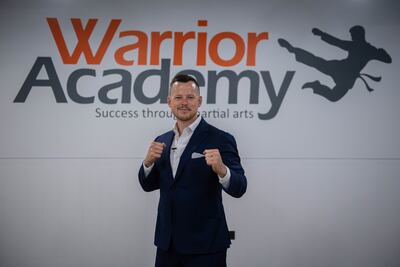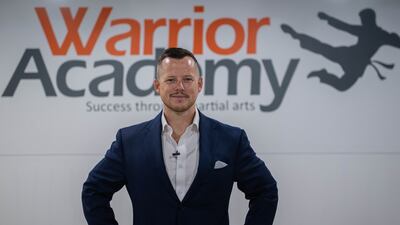Dubai-based Sebastian Bates is the founder of The Warrior Academy, a global martial arts-based character-development organisation that teaches 30,000 children across three academies and 80-plus clubs and schools.
The Briton joined the Royal Marines at the age of 16, has cycled across the Sahara, became a professional Muay Thai fighter and completed 500-plus skydives and wingsuit base jumps.
Mr Bates also survived a near-fatal parachuting accident and was told he would never walk again.
He plans to expand his academy across nine Gulf cities, while his self-funded Bates Foundation enables free tuition and projects in Kenya and Nepal.
Now 33, Mr Bates lives with his wife, daughter, five, and son, three, in Jebel Ali.
Was money abundant during your childhood?
Both my parents were in government jobs, dad in the army, mum in the National Health Service. We lived in a two-bedroom terraced house. We did not have much money at that stage, did not really go on holidays outside of camping or visiting (family in) Denmark, but it would feel like a massive adventure.
Money was never much of a conversation. Where I grew up, there was not much luxury around, but everyone seemed happy.
I had an adventure-filled upbringing, though. I would jump on tanks, do assault courses. My family valued experiences over things, and that stayed with me.
Was there pocket money?
Pocket money felt more like a curse than a benefit. The hardest jobs within the house for less than minimum wage, like picking up wet leaves in the garden. I say a “curse”, but that shapes work ethic and discipline.
Any childhood jobs?
I was about 11 and had a paper round for £3 ($3.80) an hour. At 12, I started working for a wedding crockery outsourcing company, at 14 was a waiter. By 16, I was a barman.
I was in the Royal Marines reserves until 18. I worked as a chef and studied architecture in Denmark because university was free.
After about a year, I wanted to explore. I started travelling with about £400 in my bank, a one-way ticket to India, picking up jobs, creating work around the backpacker circuit, hotels, renting out beach houses in Thailand, fire shows … anything to carry on the adventure.
What flicked the entrepreneurship switch?
Conversations around my upbringing were always about university, a career, working for the government – never creating your own thing. Travelling opened my eyes … you don’t need to necessarily get a job, you can create a solution to other people’s problems, which can then provide an income.
Why Dubai?
In 2014, I fell 50 feet from a parachute, broke both feet, ankles, both legs. I had to learn to walk again. We were growing Warrior Academy. I decided as soon as I had children I wouldn’t do any more extreme sports. I wanted to throw myself into something that would support the family, but also be an adventure.
I was here for a long weekend … no one was doing what we’re doing with a focus on character development. Within three weeks, we were leaving the countryside for a one-bed apartment in Dubai Marina (January 2019).
We took on £100,000 of short-term debt. We just had to make it work … and we grew to 250 students the first year.
Any setbacks?
Covid-19 knocked us flat in Dubai. We successfully maintained the community online but revenue dropped 95 per cent. To keep the jobs of staff I started other businesses online … mentorship, teaching people to develop online courses, a social media organisation.
After Covid, we grew to 1,000 students in Dubai, with six boutique-style dojos. Within a year from that, we were in Abu Dhabi and this summer we are launching in Doha.
What prompted Warrior Academy?
The first light-bulb moment … I wanted to do something physical, so became a personal trainer. I started teaching in this inner city Thai boxing gym, typically young men going through difficulty, social and economic challenges, who just wanted to fight each other.
Within a year, they had this new level of respect and moral compass. It was not so much about martial arts as character development. I realised the power of planting these seeds, so opened my first club for four to nine year olds.

I also wanted to teach young people they could do something they are passionate about and get paid for it, so we guarantee anybody who gets a black belt a job. It takes eight to 10 years with us, we have had 50-plus students become black belts; one became a full-time instructor and works here.
How do you protect your finances?
I was in Tiers Of Freedom by Jason Graystone, an incredible programme teaching the fundamentals of wealth and financial mastery. Many business owners have amazing businesses but no financial discipline. This really taught me that.
People who have a cash buffer are better business owners because they are less stressed and can make better decisions. For me, it is really important to maintain a decent buffer, personally and with the business … a six-month runway at least.
And wealth growth?
I invest in index funds, S&P 500, some bonds. The risk-taking side of my finances is within the business; when it comes to speculation, it should be about something you know most about.
I reinvest profits after taking a salary and that is one of the reasons we have grown quickly and we are able to do charity stuff.
What is your best investment?
Looking more at business, I would say education, through books, courses, paying for mentorship. You are investing in your ability to earn more. If you simply put money into stocks and shares versus into something that raises your value as a person … you can solve more problems and can earn more.
Any financial milestones?
Half my team in the Philippines were in a province that flooded. We raised several thousand pounds and gave out 25,000 meals to stranded people. One of the cool things was being in a position where I could rally enough money within 24 hours to make that impact.
Other financial wins … becoming financially free; realising we could, if needed, take a foot off the gas from an income perspective and rely on our investments.
founder of The Warrior Academy
How do you view money?
A lot of people do not realise how much money controls their life, so mastering money is a really important aspect of experiencing freedom. That is not to say you need to be rich to do it.
A lot of people live their whole lives chasing money and are unhappy. I have met entrepreneurs who solve the problem of personal wealth, then release this extra ability to solve bigger problems in the world because they are not thinking selfishly. I was only really able to dive into charity work once I felt secure.
What does philanthropy bring you?
Fulfilment – it brings balance to your life so you are not just about money. When you have a business that is measuring the commercial success but also impact, you have more of a chance to have fulfilment. When you look back when you are 80, you will not be like, “I'm glad I got that Ferrari”. Instead, you will be, “I’m glad I built that hospital in Kenya”. The Bates Foundation has a 100-year plan, to be a family legacy.
What spending gives most pleasure?
Experiences and adventure, I spend more on travelling than on rent. It is the best educator. I spent thousands on adventures around the world, had so many experiences that accelerated my understanding of life and development from a young age, which then meant I am able to do more with my life. Part of the joy of parenting is watching your children go through these things.

